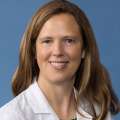About 10% of cancers are caused by inherited mutations — genetic errors that are passed down from parent to child. Learning whether an individual has such mutations can help patients, families and health care providers make informed choices about managing a cancer diagnosis or elevated cancer risk.
A growing list of genes have been linked to specific hereditary cancer syndromes, such as:
- Familial adenomatous polyposis, which can lead to numerous precancerous colon polyps and colon cancer
- Hereditary breast and ovarian cancer syndrome, which increases the risk for breast, ovarian, prostate and pancreatic cancer, and melanoma
- Lynch syndrome, which increases the risk for early onset colon cancer as well as uterine and other GI cancers
“For patients who have already been diagnosed with cancer, finding out that it is caused by a hereditary cancer syndrome may influence treatment planning,” says Mariana Niell-Swiller, MS, LCGC, director of Cancer Genetic Counseling at UCLA Health. “It may also lead to increased surveillance for related cancers.”
For the patients’ close relatives, learning that a genetic predisposition to cancer runs in the family may prompt their own genetic assessment. If they discover that they too have inherited a genetic risk for cancer, they can take proactive steps to manage the risk. Depending on the situation, these steps may include increased screening, preventive medication and/or risk-reducing surgery.
To help guide personalized strategies for preventing, detecting and treating hereditary cancers, UCLA Health committed to enhancing its existing Cancer Genetic Counseling services two years ago. Since then, the program’s team has more than doubled in size to include Niell-Swiller, three additional genetic counselors and four genetic counseling assistants.
Two physicians also play lead roles: Beth Karlan, MD, is director of Cancer Population Genetics at UCLA Health Jonsson Comprehensive Cancer Center, and Mary Sehl, MD, is medical director of Cancer Genetic Counseling.
Genetic testing stations
“One of our most successful initiatives to date involves offering point-of-care genetic services via something called genetic testing stations (GTS),” says Niell-Swiller. “The GTS approach is a way of getting genetic testing to patients with cancer who need it the most without requiring a full pretest genetic counseling appointment.”
In this approach, the patient watches an informative video which covers topics such as types of inheritance, benefits and limitations of genetic testing, and the potential impact of genetic test results. A patient whose oncologist or surgeon has recommended genetic testing can view the video at their provider’s office or at home via a video link.
The GTS approach has already shown impressive results. For example, national guidelines recommend offering genetic testing to any patient with pancreatic adenocarcinoma, the most common form of cancer of the pancreas. In 2019, only 21% of such patients at UCLA Health were offered genetic testing. That percentage has now risen to more than 90%.
Once patients receive the results of their genetic testing, those with positive results can schedule an individual appointment with a genetic counselor. But because only 10% of tests come back positive, fewer appointments overall are needed. This allows the Cancer Genetic Counseling team to maximize the number of affected patients and relatives that they reach.
More innovations to come
Additional initiatives are in the planning stages. They include a:
- Molecular tumor board, where a multidisciplinary team will discuss the care of individual cancer patients as it relates to both their inherited genetics and their tumor genomic testing results
- Precision prevention clinic, which will not only provide genetic counseling on an ongoing basis, but also support patients with navigation and psychosocial services
“Our goal is to continue growing the program to add a well-rounded set of cancer genetics services throughout the course of a family’s hereditary cancer journey,” says Niell-Swiller.
Making a patient referral
In the future, Niell-Swiller says that invitations to participate in cancer genetic counseling may be sent automatically to select patients identified through their electronic health records. For now, however, providers can .
Examples of indications for referral include having a personal or close family history of:
- Pancreatic adenocarcinoma
- Epithelial ovarian cancer
- Metastatic prostate cancer
- Breast, colon or uterine cancer diagnosed before age 50
- Triple-negative breast cancer diagnosed at age 60 or younger
- Multiple relatives on the same side of the family with breast, colon, uterine, melanoma and/or prostate cancers
“Ideally, we prefer to start by evaluating the person who has cancer,” says Niell-Swiller. “Since most cancer is not hereditary, we want to confirm whether the person who developed the cancer actually has an associated genetic finding or not. If they do, then genetic testing for their relatives is more straightforward. But if the affected family member is unavailable for testing, then close relatives should consider their own evaluation.”
Unsure whether your patient needs cancer genetic services? UCLA providers can with a colleague in Cancer Genetics Counseling.
Related:






